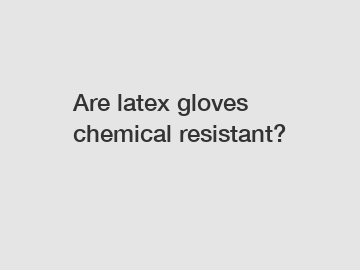Are latex gloves chemical resistant?
Are latex gloves chemical resistant?
Latex gloves are widely used in various industries, including healthcare, laboratories, and food service, for their protective barrier against contaminants. However, one question that arises is whether latex gloves are truly chemical resistant. In this article, we will delve into this topic to understand the chemical resistance of latex gloves and their suitability for different applications.
Point 1: Understanding the composition of latex gloves:

Latex gloves are typically made from natural rubber latex, derived from the sap of the Hevea brasiliensis tree. These gloves offer excellent elasticity, fit, and comfort, making them a popular choice. However, the primary concern regarding their chemical resistance lies in the fact that natural rubber latex is inherently susceptible to degradation by certain chemicals.
Point 2: Limitations in chemical resistance:
While latex gloves provide a protective barrier against many common chemicals, they may not be suitable for all chemicals and applications. Certain solvents, acids, and oils can easily permeate through the latex material, compromising the effectiveness of the gloves as a barrier. Thus, it is crucial to assess the specific chemical compatibility before using latex gloves in environments where exposure to hazardous substances is likely.
Point 3: Enhancing chemical resistance:
To overcome the limitations in chemical resistance, manufacturers often apply coatings or treatments to latex gloves. These enhancements can improve their resistance to chemicals and extend their usability. For instance, gloves with a chlorination process have a smooth surface and increased resistance to chemicals. Similarly, gloves with polymer coatings such as nitrile can provide enhanced protection against a wider range of chemicals.
Point 4: Compatibility with different industries:
The chemical resistance of latex gloves is particularly important across various industries. In healthcare settings, for instance, latex gloves are commonly used for routine patient care and examinations. They are effective against many chemicals found in detergents, disinfectants, and medications. However, it is crucial to note that latex gloves are generally not recommended for handling chemotherapy drugs, as the chemicals involved can penetrate the latex material.
Point 5: Choosing the right glove for specific chemicals:
Different chemicals require different glove materials to ensure optimal protection. For chemicals that are known to be incompatible with latex, alternative options such as nitrile or neoprene gloves should be considered. Nitrile gloves, in particular, are highly chemical-resistant and provide excellent protection against a wide range of substances. It is essential to refer to chemical compatibility charts or consult with experts to determine the most appropriate gloves for specific chemicals.
Conclusion:
While latex gloves offer numerous advantages in terms of fit, comfort, and protection, their chemical resistance is not universal. Understanding the limitations of latex gloves and their compatibility with different chemicals is crucial for ensuring effective protection in various industries. By evaluating the specific needs and considering alternatives when necessary, individuals and organizations can make informed decisions to safeguard against chemical exposure during glove use.
Want more information on Cushioned Air Chamber, Rubberized Cotton Air Mattress, Beach Inflatable Mattress? Feel free to contact us.


